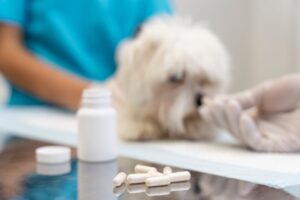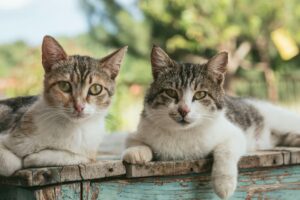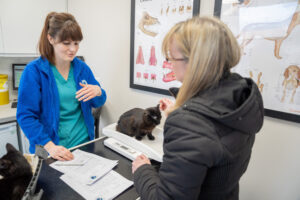Over the Christmas period, we all like to tuck into some festive treats and it can be hard to say no to the puppy eyes and pawing at your leg from pets who are desperate to have a taste for themselves. However, while dinners with all the trimmings will go down a hit with us humans, there are a number of items that can be harmful to our pets.
To guide you through a safe and merry Christmas with your pets, we’ve put together a list of foods that may not agree with our pets’ digestive systems and should therefore be kept out of paw’s reach.
Caffeine
The caffeine found in everyday items such as coffee beans, tea bags and fizzy drinks can cause your pets harm. It’s important to keep them stored securely to avoid causing heart palpitations, rapid breathing and restlessness.
Chocolate
Be mindful of everyone’s festive favourite – chocolate – as the stimulant Theobromine found in this is poisonous to your pet. It can affect their digestive, heart and central nervous systems, causing symptoms such as vomiting, diarrhoea, restlessness, hyperactivity and seizures. In some cases, these effects can be fatal.
Cooked bones
It’s common to want to share the odd tidbit with your pet while you’re cooking, but bones can be a big hazard, as they’re prone to splitting and can sometimes scratch or get lodged into your pet’s throat, as well as fracture their teeth.
Salmonella may also be present in raw bones, which is equally as dangerous and can cause vomiting, diarrhoea, abdominal pain, loss of appetite, lethargy and fevers. It’s best not to share bones, particularly raw ones, to avoid any complications.
Corn on the cob
Large chunks of corn on the cob can be hard for your pet to digest and may cause serious blockages that often require emergency surgery. Symptoms to watch out for include vomiting, loss of appetite, constipation or diarrhoea and stomach ache.
Dairy products
Most pets will find it difficult to properly digest the lactose in milk and cheese products, so it’s safer if you avoid giving them dairy altogether. In some cases, dairy can cause vomiting, diarrhoea and potential skin allergies.
Particular types of blue cheese, such as Roquefort, produced using a fungus that pets are commonly sensitive to. In extreme circumstances, animals can quickly develop muscle tremors and seizures.
Fortunately, there are plenty of pet-friendly alternatives you can try for a healthy and balanced diet, without the risk of digestive issues or allergic reactions associated with dairy consumption.
Dried fruits
Although small in size, fruits like grapes, raisins and sultanas are toxic and can cause diarrhoea, vomiting, lethargy and dehydration. In serious cases, these symptoms can lead to kidney failure, which is often fatal. Common festive treats like mince pies, stollen and Christmas pudding should be kept safely away, as they’re packed with these fruits.
Macadamia nuts
In general, it’s not advisable to give your pet any nuts, but this is especially important with macadamia nuts, as they are the most toxic. It can take just 12 hours after ingestion for the symptoms to appear, which include weakness, depression, tremors, vomiting and increased body temperature. Effects can sometimes be fatal.
Nutmeg
Nutmeg is often used to add spice to festive treats but it’s highly poisonous to pets. Symptoms to be aware of are tremors and seizures.
Pigs in blankets
Pigs in blankets tend to be a staple in UK homes over Christmas – and with good reason for us humans! However, because of the fat and salt content, you should avoid slipping one or two to your pets at the dinner table. When eaten, foods like this can cause digestive issues including pancreatitis, where the pancreas becomes inflamed. Keep an eye out for vomiting, loss of appetite and abdominal pain, as these can be common symptoms.
Raw ingredients
Offering your pets fat trimmings, raw meat, raw eggs and raw fish should be avoided at all costs. Raw ingredients like this can cause salmonella, which may induce vomiting, diarrhoea and loss of appetite. For cats in particular, too much fat can lead to pancreatitis.
Stuffing
Common types of stuffing – including sage and onion – contain a number of ingredients that can be dangerous to pets. Things like onions, garlic, leeks, shallots and chives (those that belong to the allium family) contain a substance that causes damage to the red blood cells of pets and can lead to life-threatening anaemia. Signs that your pet may have ingested these items include tiredness and lethargy.
Xylitol
The artificial sweetener, Xylitol (which is found in many sugar-free sweets, cakes, gum and diet foods) can trigger a sudden release of insulin in cats and dogs. This may cause seizures and damage to their livers. Be on the look out for signs such as vomiting, weakness and lack of coordination.
Yeast dough
Fermented yeast dough can produce alcohol which is toxic to your pet. Common symptoms to watch out for include bloating, excess gas and constipation.
Just because there are particular foods that your pet should steer clear, it doesn’t mean they can’t join in the festivities! Instead, why not treat them to some delicious cat and dog friendly treats that they’ll love just as much.
If you have concerns about your pet’s health, contact your local St Kitts practice immediately:
St Kitts Vets Hartley Wintney: 01252 844044
St Kitts Vets Basingstoke: 01256 844944
Crookham Park Veterinary Centre: 01252 913990
Firgrove Veterinary Centre: 01252 877799





